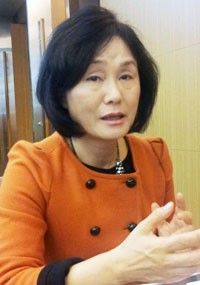Park Kyung-ae, below right, director of Center for Korean Research at the University of British Columbia (UBC), talks about her paper “The Missing Link in Korean Studies: University Soft Power and Academic Exchanges with North Korea.” She gave a presentation of her paper at the international conference organized by the Academy of Korean Studies on Oct. 24-25 at Intercontinental Seoul COEX in southern Seoul.
/ Courtesy of Academy of Korean Studies
By Chung Ah-young
Over the past two decades, Korean studies has grown into an attention-grabbing academic discipline because of astonishing Korean economic and cultural development. Particularly, Korean study programs and research institutes have been established in North American universities to cater to the rising demand there.
However, Korean studies is facing a stumbling block for its sustainable growth because of limited access to half of the information and research from North Korea.
“Engaging North Korea in an effort to expand Korean studies has long remained an unexplored opportunity, with academic exchanges and communications with North Korean scholars exceedingly rare. Gaining the momentum in spreading the discipline of Korean studies around the world, it is high time to engage the academic community of North Korea in order to further enhance the Korean studies discipline,” said Park Kyung-ae, director of Center for Korean Research at the University of British Columbia (UBC).
Park gave a presentation of her paper titled “The Missing Link in Korean Studies: University Soft Power and Academic Exchanges with North Korea” at the international conference of “Intellectual Institutional Trends of Korean Studies in North America” on Oct. 24-25 at Intercontinental Seoul COEX in southern Seoul. The conference was hosted by the Academy of Korean Studies (AKS).
She introduced UBC’s Canada-DPRK Knowledge Partnership Program (KPP) which was launched in 2010 to academically engage North Korea through knowledge sharing. “The KPP is the first and only academic exchange program with North Korea in North American region as the long-term project,” she said.
The KPP invites North Korean university professors for a six-month study program at UBC which consists of business, trade, and economics courses as well as English language and culture classes. The KPP was designed to take advantage of human resources in North Korea by providing them with in-depth knowledge of the international economy. The program focuses on educating North Korean scholars in modern economic theory, finance, trade, and business practices to make them use what they learn from the program in their country when they return home.
“For now the KPP is focusing on educating North Korean scholars but ultimately we expect the scholars from the two Koreas would actually share the academic researches which both scholars can hardly gain access to,” she said.
The KPP hosted six North Korean scholars, five from the Kim Il Sung University and one from Wonsan Economic University in 2011. The scholars took English courses during the summer and business and management courses focusing on international trade, management, finance, and economics. As part of the curriculum, participants completed a group research project on international trade/finance. They took field trips, and met leading individuals in Canada’s financial, business, and legal communities, as well as fellow academics.
Now in its third year, the KPP is currently hosting another group of six participants, this time from Kim Il Sung University, the University of National Economy, and the Pyongyang University of Foreign Studies. These scholars are provided with in-depth education of the international economy and policies.
“As South Korean scholars are doing research on Korean studies, North Korean counterparts might be doing so. To complete Korean studies, we need their academic research. Finding the missing link between the two Koreas’ scholarship through academic engagement with North Korea is a necessary step for increasing the depth and breadth of Korean studies,” she said.
Educational institutions such as universities can play a crucial role in the form of “university soft power.” “Non-state actors are inherently effective in using their expertise to initiate knowledge sharing with Pyongyang,” she said.
Since the mid-1990s North Korea has participated in various knowledge sharing and educational exchange programs initiated by both NGOs and educational institutions, mostly for short-term periods, including those with non-socialist and politically non-friendly countries. These knowledge sharing programs show that the North Korean government can be a “willing interpreter and receiver” for the purposes of applying soft power concepts.
Despite fundamentally different cultural, social and political characteristics, Western educational institutions are steadily building confidence with their North Korean counterparts and have been pursuing knowledge sharing initiatives both inside the country and abroad since the early 2000’s.
“The KPP is one of the most recent and successful cases of such initiatives. We expect that academic cooperation between the two Koreas can contribute to political situations,” she said.
She conducted exit interviews with the participants and she found they returned home with quite encouraging results. They gained new knowledge and its application through case study-based methods of research and teaching.
“It is too early to measure the overall impact of the KPP as it is only in its third year. The KPP provides a non-political forum for open dialogue with North Koreans on a variety of issues to build North Korea’s confidence in engagement with educational institutions and allow the formation of meaningful personal and institutional relationships,” she said.
Source: http://www.koreatimes.co.kr/www/news/culture/2013/10/386_145010.html